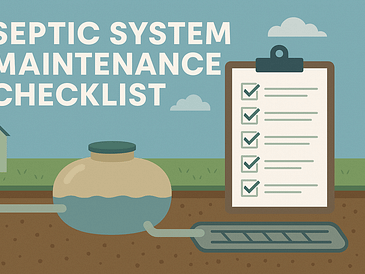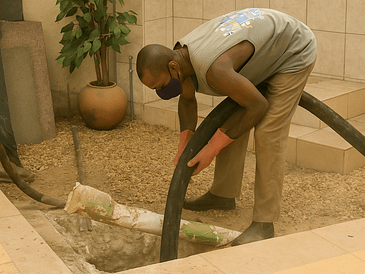When it comes to wastewater management, septic tanks have been a traditional choice for homeowners. However, there are alternative septic system options that are worth considering. These systems offer effective treatment of wastewater and can be a viable alternative to conventional septic systems. In this article, we will discuss various types of alternative septic systems and their benefits.
Understanding Septic Tanks
What is a Septic Tank?
A septic tank is an underground chamber made of concrete, fiberglass, or plastic, used for the treatment of wastewater. It is a crucial component of a septic system that manages the sewage generated by a household or building.
How Does a Septic System Work?
A septic system works by collecting and treating wastewater from a property. The wastewater, also known as effluent, flows into the septic tank, where the solids separate from the liquid. The liquid, or effluent, then continues to the drain field for further treatment and disposal.
The Role of a Septic Tank
The septic tank plays a vital role in the overall functioning of a septic system. It is responsible for the initial treatment of the wastewater, separating solids from liquids through a process called anaerobic digestion. The liquid effluent is then released into the drain field for further treatment.
Common Types of Septic Systems
Mound Systems
Mound systems are a type of alternative septic system that is commonly used when the water table is too high or the soil conditions are not suitable for a traditional septic system. These systems require undisturbed soil to function efficiently.
Why Mound Requires Undisturbed Soil?
Mound systems require undisturbed soil to ensure proper drainage and treatment of wastewater. The undisturbed soil acts as a natural filter, removing contaminants and impurities from the wastewater before it returns to the groundwater.
Aerobic Treatment Systems
Aerobic treatment systems are another alternative to septic tanks. These systems use air to promote the growth of aerobic bacteria, which break down organic matter more effectively than anaerobic bacteria. This type of system is especially useful in treating high-strength wastewater.
Sand Filters
Sand filters are a filtration system commonly used in alternative septic systems. The wastewater passes through a bed of sand, where solids and contaminants are trapped. The filtered effluent then continues to the drain field for further treatment.
Constructed Wetlands
Constructed wetlands are a natural and environmentally friendly alternative to septic tanks. These systems mimic the processes of natural wetlands, using vegetation and microorganisms to treat wastewater. The plants and microorganisms in the wetland help remove nutrients and contaminants from the wastewater before it is discharged.
Conventional Systems
Conventional septic systems, also known as traditional septic systems, are the most common type of septic system found in residential properties. These systems consist of a septic tank and a drain field, and they rely on the natural processes of anaerobic digestion and soil filtration for wastewater treatment.
Alternative Septic System Options
Drip Distribution Systems
Drip distribution systems are a type of alternative septic system that uses a series of small, perforated pipes to distribute effluent evenly over a designated area. This type of system is particularly useful in areas with clay or compacted soils that may not absorb wastewater effectively.
Chamber Systems
Chamber systems are an alternative to traditional drain fields. They consist of a series of interconnected plastic chambers that provide a large surface area for effluent distribution. These systems allow for better oxygen exchange and promote efficient treatment of wastewater.
Aerobic Treatment Units
Aerobic treatment units (ATUs) are compact systems that use aerobic bacteria to treat wastewater. These units incorporate mechanical aeration to promote the growth of aerobic bacteria, resulting in more efficient treatment of wastewater.
Leach Fields
Leach fields, also known as drain fields or absorption fields, are an essential component of septic systems. In alternative septic systems, leach fields are designed to enhance the treatment of wastewater and facilitate its absorption into the soil.
Treatment Plants
Treatment plants are larger-scale alternative septic systems commonly used in commercial or municipal settings. These plants use advanced treatment processes to handle higher volumes of wastewater and may incorporate additional technologies such as UV disinfection or chemical treatment.
Benefits of Alternative Septic Systems
Alternative septic systems offer several benefits compared to traditional septic tanks. These include: 1. Enhanced treatment capabilities: Alternative systems often provide more efficient treatment of wastewater, reducing the amount of pollutants and contaminants discharged into the environment. 2. Versatility in challenging conditions: Alternative septic systems can be tailored to accommodate challenging soil conditions, high water tables, or small lot sizes where traditional septic systems may not be feasible. 3. Environmentally friendly: Many alternative septic systems utilize natural processes and technologies that are more environmentally friendly, promoting the sustainable management of wastewater. 4. Potential cost savings: Depending on the specific circumstances, alternative septic systems can be more cost-effective to install and maintain than traditional septic tanks.
Any Way To Build Over Existing Septic System?
Building over an existing septic system can be challenging, as it may require careful planning and adherence to local regulations. It is crucial to consult with a professional septic system designer or installer to assess the feasibility and potential impact of any construction activities.
Any Way to Run Driveway Over Drain Field?
Running a driveway over a drain field can pose risks to the septic system’s overall functionality. The weight and pressure from vehicles can compact the soil, limiting its ability to absorb and treat wastewater effectively. It is generally recommended to avoid building structures or driveways over drain fields to ensure their proper operation.
Choosing the Right Alternative Septic System
Selecting the appropriate alternative septic system depends on various factors, including property size, soil conditions, water table level, and local regulations. It is essential to consult with septic system professionals who can assess these factors and recommend the most suitable system for your specific needs.
Conclusion
When considering septic systems, it is worth exploring alternative options that offer effective wastewater treatment and environmental sustainability. Alternative septic systems provide versatile solutions that can overcome site limitations and improve treatment capabilities. By understanding the different types of alternative septic systems and their benefits, homeowners can make informed decisions about wastewater management for their properties.
Choosing the Right Alternative Septic System
Choosing the right alternative septic system is crucial for homeowners who are not connected to a centralized sewer system. Alternative septic systems are designed to treat wastewater on-site and prevent any harm to the environment. There are several factors to consider when selecting the most suitable system for a property. Firstly, the size of the property and the number of residents should be taken into account. Different systems have varying capacities for handling wastewater, so it is important to choose one that can adequately handle the amount produced. Additionally, the soil type and condition on the property are also important factors to consider. The septic system relies on the absorption and filtration of wastewater into the soil, so it is essential that the soil is suitable for this process. Some alternative systems, such as sand mound systems or aerobic treatment units, may be more suitable for properties with poorly draining soil. Furthermore, it is important to consider the ongoing maintenance and operational costs of the system. Some systems require regular maintenance and expensive components, while others are relatively low maintenance. Homeowners should also research and consider the local regulations and requirements for septic systems. Different jurisdictions may have specific guidelines and limitations on the type of system that can be installed. Therefore, it is crucial to ensure that the chosen system complies with local regulations. It is also worth considering the environmental impact of the alternative septic system. Some systems may be more environmentally friendly, utilizing eco-friendly technologies or minimizing the release of harmful substances into the environment. Lastly, homeowners should seek professional advice and assistance when choosing the right alternative septic system. Septic system installers have knowledge and experience in selecting and installing the most suitable system for a property. They can assess the site conditions and make recommendations that meet both the property’s needs and local regulations. In conclusion, choosing the right alternative septic system requires careful consideration of factors such as property size, soil conditions, maintenance costs, local regulations, environmental impact, and professional advice. A well-chosen septic system will ensure efficient wastewater treatment and minimize harm to the environment.
Alternatives to Septic Tanks FAQ
What are alternatives to septic tanks?
Alternatives to septic tanks are wastewater treatment systems that provide an alternative to the conventional septic system. These alternative systems use different methods to treat wastewater and dispose of the effluent.
What is a wastewater treatment system?
A wastewater treatment system is a system that treats wastewater, such as sewage, to remove contaminants and make it safe for disposal or reuse. It can include various components and processes, depending on the type of system.
How does an aerobic treatment system work?
An aerobic treatment system uses oxygen to facilitate the breakdown of organic matter in wastewater. It typically consists of a treatment unit that promotes the growth of aerobic bacteria, which consume and break down the waste.
What are mound systems?
Mound systems are an alternative to traditional septic systems, particularly in areas with high water tables or poor soil conditions. These systems involve the construction of an elevated mound of sand or gravel, which acts as a filter and provides additional treatment for the effluent before it is discharged into the soil.
How do alternative septic systems work?
Alternative septic systems work by employing different technologies and processes to treat wastewater. Some examples include sand filters, aerobic treatment units, and drip distribution systems. These systems provide additional treatment and disposal options, particularly for challenging site conditions.
What types of alternative septic systems are available?
There are various types of alternative septic systems available, including sand filter systems, aerobic treatment units, mound systems, chamber systems, and drip distribution systems. Each type has its own advantages and suitability for different site conditions.
What is a leach field?
A leach field, also known as a drain field or absorption field, is a component of a septic system or alternative septic system where the treated wastewater is discharged into the soil. It consists of a series of perforated pipes or chambers that distribute the effluent over a large area, allowing it to be naturally filtered and absorbed into the ground.
What types of septic system alternatives are suitable for areas with high water tables?
For areas with high water tables where traditional septic systems may not





